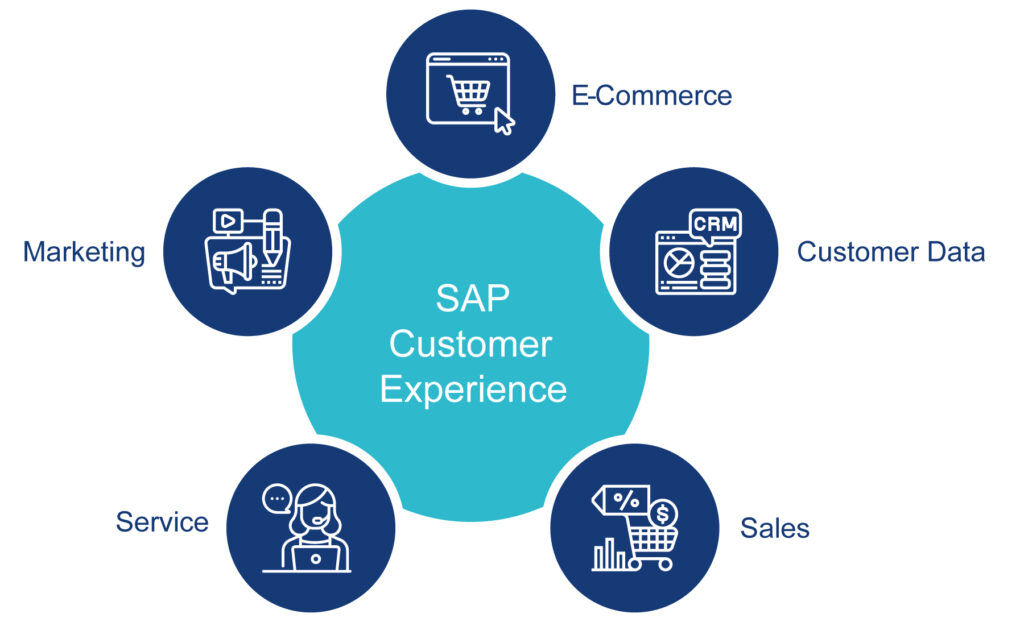What is SAP Customer Experience (CX)?
In today’s highly competitive business landscape, simply offering a great product or service is no longer enough. Companies must focus on delivering an exceptional customer experience to build long-term relationships and differentiate themselves from competitors. This is where SAP Customer Experience (CX) comes in.
SAP Customer Experience is a comprehensive suite of cloud-based solutions designed to help businesses create meaningful and personalized interactions across multiple customer touchpoints. By integrating marketing, sales, commerce, customer service, and data management, SAP CX enables companies to foster brand loyalty and maximize customer lifetime value.

Modern customers expect personalized, seamless experiences across all channels. SAP CX allows businesses to deliver consistent and data-driven engagement, enhancing customer satisfaction and driving business growth.
With the rise of digital transformation, businesses are increasingly leveraging AI, automation, and analytics to optimize customer interactions. SAP CX equips organizations with the tools they need to stay ahead of customer expectations while ensuring compliance with data privacy regulations. Whether a company operates in B2B or B2C sectors, SAP CX provides scalable solutions to streamline operations and improve overall customer engagement.
Key Components of SAP CX
The SAP Customer Experience suite consists of five core cloud solutions, each addressing a critical aspect of customer engagement. These solutions work together to create a unified, end-to-end experience that enhances customer satisfaction and operational efficiency.
SAP Marketing Cloud
In the digital age, marketing success relies on delivering the right message to the right audience at the right time. SAP Marketing Cloud helps businesses achieve this by providing advanced customer segmentation, AI-driven analytics, and real-time campaign management.
With SAP Marketing Cloud, companies can:
- Analyze customer behavior and preferences to create personalized marketing campaigns.
- Leverage AI and machine learning to predict customer needs and optimize marketing strategies.
- Automate email, social media, and digital advertising campaigns to improve engagement.
- Measure campaign performance with real-time analytics and adjust strategies accordingly.
For example, a global retail brand using SAP Marketing Cloud was able to increase its email open rates by 35% by leveraging AI-powered personalization. The system automatically identified the most relevant content for each customer, ensuring higher engagement and conversions.
SAP Commerce Cloud
Today’s consumers demand a seamless shopping experience across multiple channels, whether online, mobile, or in-store. SAP Commerce Cloud enables businesses to create a unified e-commerce ecosystem that delivers personalized and consistent interactions.
The key features of SAP Commerce Cloud include:
- Omnichannel commerce support, ensuring a consistent shopping experience across web, mobile, and physical stores.
- Personalized product recommendations based on customer browsing history and purchase behavior.
- Intelligent inventory management that optimizes stock levels and fulfillment processes.
- AI-powered search functionality to help customers find products faster.
One real-world example is a major fashion retailer that implemented SAP Commerce Cloud to enhance its online and in-store shopping experience. By integrating customer data from multiple channels, the company was able to offer personalized promotions and product recommendations, resulting in a 25% increase in sales.
SAP Sales Cloud
Sales teams need real-time insights and automation tools to close deals faster and improve customer relationships. SAP Sales Cloud provides a powerful solution that streamlines the sales process, enhances collaboration, and boosts productivity.
With SAP Sales Cloud, businesses can:
- Automate lead management and follow-ups, reducing manual work for sales representatives.
- Gain AI-driven insights into customer needs, enabling data-driven sales strategies.
- Improve forecasting accuracy with real-time sales analytics.
- Enhance customer relationships with automated engagement tracking.
For instance, a multinational software company used SAP Sales Cloud to automate lead nurturing and prioritize high-value prospects. This resulted in a 30% increase in sales conversions and a significant reduction in sales cycle times.
SAP Service Cloud
Customer service plays a crucial role in brand reputation and customer retention. SAP Service Cloud equips businesses with the tools they need to provide fast, efficient, and personalized support experiences.
Key capabilities of SAP Service Cloud include:
- AI-powered chatbots and virtual assistants to handle common customer inquiries.
- Automated ticketing systems that ensure timely responses to customer issues.
- Integration with CRM systems to provide a 360-degree view of each customer.
- Real-time analytics to monitor service performance and identify areas for improvement.
One telecommunications company successfully implemented SAP Service Cloud to reduce response times by 40%. The company leveraged AI-powered automation to route customer inquiries to the most appropriate support agent, resulting in higher customer satisfaction ratings.
SAP Customer Data Cloud
With increasing concerns over data privacy and security, businesses must manage customer data responsibly. SAP Customer Data Cloud ensures compliance with global data protection regulations while enabling businesses to collect, analyze, and leverage customer information securely.
The benefits of SAP Customer Data Cloud include:
- Transparent and user-friendly consent management to build trust with customers.
- Secure data storage and access controls to protect customer information.
- Integration with other SAP CX solutions to enhance personalization.
- Compliance with GDPR, CCPA, and other global data protection laws.
For example, a financial services firm implemented SAP Customer Data Cloud to streamline its customer onboarding process. By automating identity verification and consent management, the firm improved regulatory compliance while enhancing the customer experience.
Why Businesses Choose SAP CX
Companies across industries are turning to SAP CX for its powerful combination of AI, automation, and analytics. Some of the top benefits include:
- Personalized Customer Engagement: Deliver tailored experiences based on real-time customer data.
- Operational Efficiency: Automate processes across marketing, sales, and service to reduce costs and improve productivity.
- Data-Driven Decision Making: Leverage AI-powered insights to optimize strategies and predict customer behavior.
- Scalability: Adapt to changing business needs with a flexible, cloud-based architecture.
- Compliance and Security: Ensure customer data is managed securely and meets regulatory requirements.
Future of Customer Experience with SAP
The future of customer experience is centered around AI-driven personalization, predictive analytics, and seamless omnichannel interactions. SAP CX is continuously evolving to help businesses stay ahead of these trends.
As organizations embrace digital transformation, SAP CX will play a crucial role in enabling businesses to deliver connected, intelligent, and personalized experiences at scale.
Investing in SAP CX is not just about technology—it’s about building meaningful customer relationships that drive long-term business success.
By leveraging the power of SAP CX, businesses can position themselves for growth, enhance customer loyalty, and stay ahead of the competition in an increasingly digital world.







